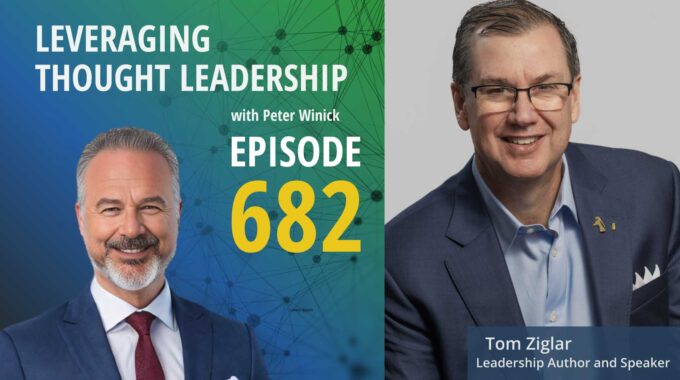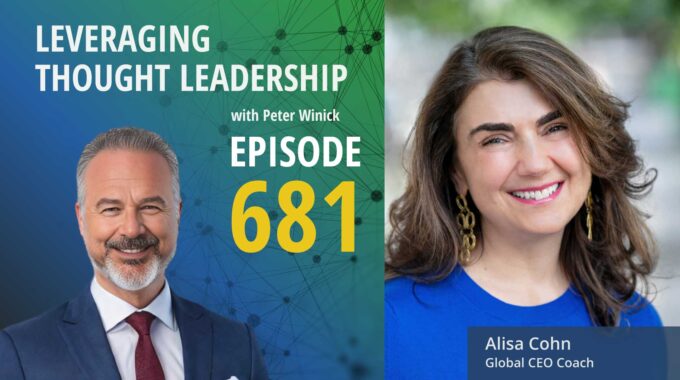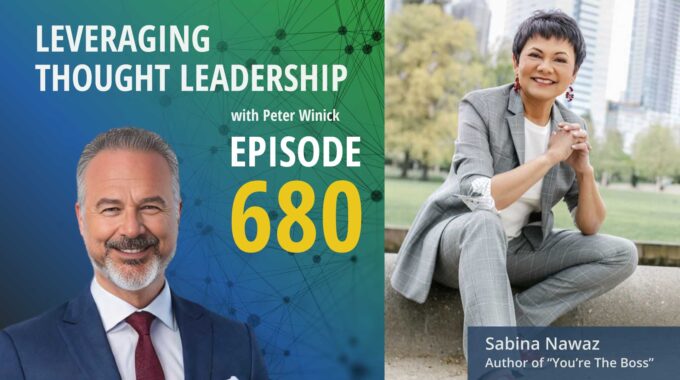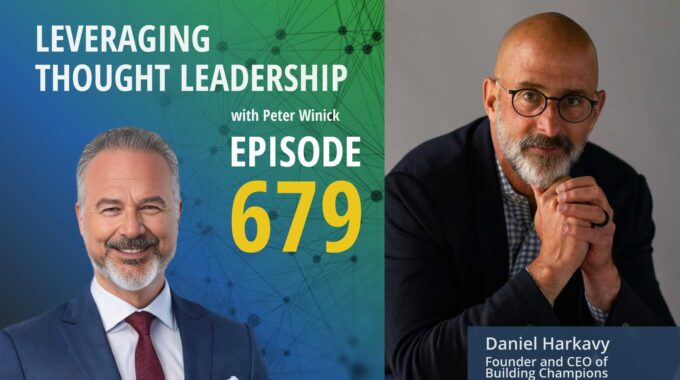How AI, Programs, and Trust Turn Ideas into a Life-Changing Business This episode explores how…
Transitioning Thought Leadership | Matias Obludzyner
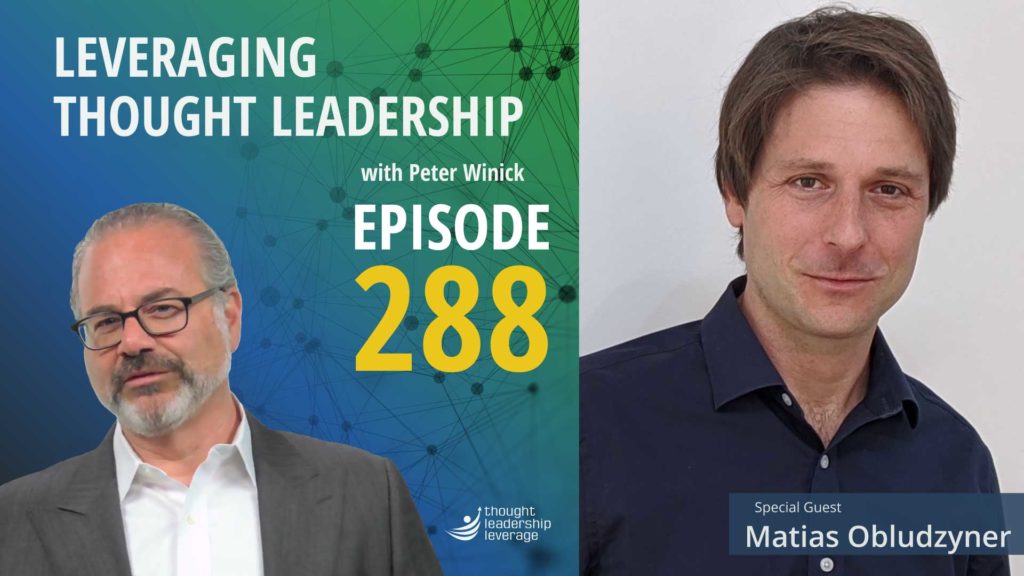
Taking your thought leadership from a corporation to a solo act.
An interview with Matias Obludzyner about transitioning positions, authoring a book, and the value of communication.
Today’s guest is Matias Obludzyner, a leadership and communications consultant with years of experience at the International Finance Corporation and author of Expanding Circle.
Matias shares his experience working at the IFC helping leaders with communication and change management. Afterwards, he explains how his time working with incredible leaders there was a key influence in writing his book.
We discuss how Matias has struck out on his own to help the leaders of other organizations with how they position themselves externally and how they influence others. Furthermore, we chat about finding the first clients, developing price and scope without a known brand behind you.
Finally, Matias shares the journey of writing the book which started before he left IFC. He discusses what the book brings to the table in the next phase of his career. Then, explains how he uses it to his advantage, and how he promoted the book.
If you want to take your thought leadership out of a corporation and go it alone, this episode is filled with great advice.
Three Key Takeaways from the Interview
- Thought leaders can learn from the experience of the others they’ve worked with and include it in their own content.
- If you are to successfully market your thought leadership, you’ll need to know who you are solving problems for and what the problems are.
- Adding a book to your thought leadership toolbox is a great way to start conversations with potential clients.
Are you trying to transition to thought leadership from your current career? Do you need help strategizing your next steps? Contact Thought Leadership Leverage and we can assist you!
Transcript
Peter Winick And welcome, welcome, welcome. This is Peter Winick. I’m the founder and CEO of Thought Leadership Leverage. And you’re joining us on the podcast today, which is Leveraging Thought Leadership. Today, my guest is Matthias Obludzyner. And Matthias is a really, really interesting guy. He and I got to talking about a week or so ago and let me just sort of give you the condensed version of his bio. He’s got a new book out called The Expanding Circle How Genuine Leaders Connect with Themselves, Connect with Others and Make a Difference, which is an amazing book. He spent a long time at the World Bank working with some amazing organizations like IFC, which is part of the World Bank, actually. And he was at Ogilvy and he was at the Inter-American Development Bank. He is a Fulbright scholar with a master’s in public management communications from GW. And he’s also a certified coach. So like with most of our guests, if we spent too much time on his bio, we wouldn’t have any time to talk. So let’s just sort of dive in here. So welcome aboard. You’re now sort of in this world of thought leadership, sort of independent from organizations where you’re out on your own now. So maybe tell us about that journey.
Matthias Obludzyner Thanks so much for having me and a pleasure to be here.
Peter Winick So my pleasure.
Matthias Obludzyner I own my own. And at the same time, working with a lot of people. That’s true. After 11 years at the World Bank, I decided to transition a little bit. My is to draw on what I had done before. And I wrote this book, the expanding Sample, which is about leadership and how leaders can be authentic and remain engaged and engage with others in a way that they can get right.
Peter Winick So your background, your background is in communication. And then you do a yes, your original background, and then you wind up at the World Bank, which is not necessarily known as a communications organization. It’s a bank. Right. So how did how did what your expertise in the bank lead you to think about what ultimately has become the book?
Matthias Obludzyner Okay. Yeah. So let me tell you let me let me back into that. So, yes, that’s true. I studied even more. I studied public administration and communication. And then when I went to the World Bank, when I was finishing my master’s degree in the in the U.S. and I got a call for an interview. And it was not the public sector part of the work, but, you know, the work family. Yeah, it was the private sector. The part that is your finance, it’s like the in the sense that they it’s like an investment bank for private sector companies in emerging markets. So it’s like and I was like nothing I know down from the private sector. And well they, they like me somehow they hire me and they send me to study finance, which was very important. And I took it very seriously because I thought if I will get some credibility here with the management, I need to know what they are talking about. And almost right after I started there, I started working for different leaders, senior leaders of the organization, helping them first with communications, the traditional communications promotion. But then I got involved in the staff engagement and positioning, and I started helping them with the organizational development, the change management. And so over all these years, I, I been very lucky. I saw great leaders working, and I was part of that. And I was able to help them a little bit. And this book, what they do, I try to capture the best practices that I saw.
Peter Winick Got it. So now that you’ve completed the book and you’ve left the World Bank, what are the types of problems that you’re solving and for whom? So what does it look like now?
Matthias Obludzyner In a way. In a way. Okay. I keep doing the same. I keep going for the leaders organization and the leaders, and I get them with talent. They. They influence, they positioned themselves externally and influence that. That’s pretty much it.
Peter Winick So I want to pause you there, because oftentimes what I’ve seen happen with sort of internal folks that are embedded in an organization where they get a thought in their head, maybe I’ll go out on my own one day and be an entrepreneur and start my own thing and whatever. And then they sort of freeze. And the way you so smoothly sort of answer that question of, well, you’re doing the exact same thing, right? You’re working with senior leaders, helping them solve the same problems. The only difference is you’re not a staff member of an organization. So you have to develop those relationships and, you know, sell it, market it, fill your minds, etc.. But at the end of the day, if you parking lot, the economics in your parking lot, the marketing and sales, what your days look like now aren’t that much different when you get down to what are the types of products that you’re working on.
Matthias Obludzyner Let me let me try it through. I said, I’m doing this saying what they was. And I’m not sure that’s the right way of wording, but what is the way the expertise that I bring is the same. And I’m building on what I learned working for these leaders. And I when I thought about this career transition, it’s like, okay, let’s go. Let’s do it incrementally. It’s like, okay, I have this expertise Advising leaders on communications, organization and development led to that. It’s a big change. It’s big enough that now I have all my all. And so I tried to It’s like trying to pivot on what you already know. Having said that, and at the same time, something happened, at least in my case, in the last couple of years, I had already started working with some clients on this site.
Peter Winick Right. So I want to. So let’s talk about that, because oftentimes to mitigate the risk of going out on your own, you can start doing things assuming that you have that freedom and you’re not constrained from an employment contract perspective to say, wait a minute, why does it need to be binary? Why do I need to quit my job on Jan one and then find a client on Jan two? You know, I have a little bit of bandwidth. You know, you can you can pick up 20 clients, probably be overwhelming, but you can pick up a handful of clients, sort of test the market. Did that help you figure out the pieces that were new to you in terms of pricing and scoping and contracting and all that?
Matthias Obludzyner Yeah, that’s a very good comment because when I was saying, well, I say I keep doing the same. And then I said, Well, I’m not sure that’s the right word. Wait a minute. There is this whole war which is deeper. You know your own problem. You need to market yourself. You need to know how to price. When you work for a natural organization, there are things that are even there are other complexity node. So it’s not necessarily the same kind of advice that you can give somebody when you are part of the same organization. And sometimes, like when you come from outside, you can tell them the hard truth. I mean, right. The ego sometimes.
Peter Winick That that naivete that you have around their corporate culture or politics or something like that could work in your benefit. Right. Versus if you’re all at the same organization like the World Bank. There’s this unwritten rule of we don’t do things that way. Whatever that means, right?
Peter Winick If you’re enjoying this episode of Leveraging Thought Leadership, please make sure to subscribe. If you’d like to help spread the word about our podcasts, please leave us a review and share it with your friends. We’re available on Apple Podcasts and on all major listening apps as well as at ThoughtLeadershipLeverage.com/podcasts.
Peter Winick So I would also want to ask because when I’ve seen people do what I call sort of a soft transition instead of just sort of diving in, you know, they do a little bit of clients on the side, etc. More often than not, I want to see this is if this is true in your case, the initial handful of clients that they have, sometimes the initial handful of clients that will last them the first 3 or 4 years of business are people that they already knew, right? People that were already they had a relationship with, etc.. How did how did you go about finding those first few clients? And I would imagine it’s not a heavy marketing activity, but people that are already in your network, in your circle.
Matthias Obludzyner Yeah. I mean, and I think this is my goal is I would say my goal is to be very good at what I do and make sure that I bring value to whoever I am. I’m sorry. And so I said, okay, I have this kind of pool of clients. Let’s focus on them. Let’s make sure that they are happy with me. And then in the morning it’s going to start to increase. And it’s not necessarily a matter of numbers. It’s a matter of like to find the clients that I are the right fit for me. Having said that, at this point, it’s like I’m not am I’m not like I’m I’m not like about like, I just want to do this on my own. I’m fine working for other organizations to the extent that I feel that that’s the right fit to find the right clients and where I can do my best.
Peter Winick Got it. So. How does and maybe I want to see where the book plays in. So you’ve got the book and the book started before you started the business. How is that related to or how does that support your launch of the business? Having a book under your belt that.
Matthias Obludzyner Yeah, the book. The book is started in a way. I’ve been thinking about this book for a long time. And the book is started when I already knew that day would be war, that I would be leaving the work and. And it was also, as I said, I had been I mean, I thought for a while before I even started writing the book. And it was a way for me to understand what I would bring in my next phase of my career, what I really enjoyed doing, where I wanted to focus and also to think, okay, how these skills and these issues that I have been working on, how will it be relevant looking forward? And I finish them. I started writing the book before I left. I finished the book and I was already on my own. And I thought, okay, this book is going to help me position myself. And I then destroyed. I don’t see this book. I say, I saw the book as a tool to start conversations. So got to work to reach out to this network. I already have. And I have this conversation about, okay, this is so.
Peter Winick So share with us, if you would, an example or two of how you use the book for that purpose. Because I think what happens is people go down the path of writing the book, and certainly the first wave is, well, what is my going to write about? What am I not going to write about it? How am I, you know, how do I codify my thinking? The models, the frameworks, realizing that the constraints of a book of a limited number of pages force you to get really, really tight about what you want to say and what you and more importantly, what you want to leave out. Then the book is done. And it can either, you know, sort of sit on the proverbial shelf or there’s a different hat that you have to put on, which is to get the book out in front of the people that matter. So tell me a little bit about the second piece there. What if what have you been doing? And maybe this podcast is an example of that.
Matthias Obludzyner I used to work for somebody with feature. In the book. Her name is Rachel Kyte. She’s now the dean of the Fletcher School in the International Relations School at Tufts University. And she used to say, you have to invest as much resources and time and thinking, especially thinking in producing that book, that report, whatever knowledge product you are producing, as in thinking how you are gonna. You’re going to use what’s going to be your marketing strategy.
Peter Winick And right. So what I want to make sure I got that so same amount of effort writing the book as marketing. And I would argue I agree with that 100%. You know what? Yeah. Well, I would say maybe even it’s as hard, if not harder to market the book because for many people there’s a self-selection process. People that hate writing typically don’t engage in the activities of writing a book. So ultimately, when you complete a book, there is some joy, some satisfaction. You know, I’m proud of this. This really you know, I got to meet some interesting people. This really reflects who I am, my thinking, etc.. But then that the domain of marketing, it’s like I don’t know anything about that. That’s the point. Where do I even start? Do I stand on the corner and about Do I you know, what do I do and what do I not do? And then you have to become which I think is hard for a lot of experts to do, have a beginner’s mind and say, ah, okay, so I know nothing about this. Where am I going to learn and how am I going to.
Matthias Obludzyner Yeah, in my piece, perhaps because in part what I do with my clients is to have them with communications. And so I have some expertise in doing that. And because my mind works in a way like that. Once I started writing the book, you know, it’s not that they want to know exactly how it’s going to look like. It’s a process. It’s it’s art in a way. You need to try different things. But I was thinking, okay, I was having in mind how I would use this book. And if you see the book, it’s like I talk about like genuine leadership, a kind of leaders, leaderships that are leaders that are really good at understanding things that they work. Ha. In understanding themselves, they also communicate use based on that understanding that they have a sense they connect with others in a very open, generous way and they are good at aligning that you what they call that you see the inner.
Peter Winick Yeah, yeah, yeah.
Matthias Obludzyner And when that happen, their influence expands. So I came up with the framework to explain this based on my experience. So I, I featured different leaders which are. Yep. Yes. I have worked for in the, for the most part. And I saw I was thinking how to use these. Okay. These are in a way like I will market the book. I want people to see, this guy already has experience working for. Yes. Or someone. So yeah, yeah. It’s probably good if he works for me or. Or even the people I interview where people already know me. Now they will have a tool if they want to confirm.
Peter Winick Yes, I want to I want to just comment on that. So oftentimes people separate. The content development from the business development, if you will, and what you’ve done is able to complete thing are. So I’ve interviewed whatever the 6 or 8 people, I’ve strategically picked those people not just from a marketing perspective, but I’ve taken that into consideration. Right? Who are they? What are their stories? How well I know them, how much it aligns to my thinking and all things being equal, the ones that can help you from a marketing perspective or exposure perspective on the book that’s going to help you make the decision as well. Because some of those people might be whatever more well-known than you or have bigger followings in you or whatever, and you have to put some systems and processes in place so that they can help you get that book out there. Because a lot of people will say, Hey, because great, I’m glad you’re writing a book. Good luck with that. Let me know if there’s anything I can do and then the author never comes back to them. Well, they’re not going to stay up late at night trying to figure out how to make your book.
Matthias Obludzyner It’s so for me to tell them and make it easy for them. Yes. What we want in your network, people who know we always want to guess, remind you. Tell them what? What you need and what that what When I’m hearing you and I’m thinking, okay, in my case, in a way, it came like it comes naturally to me because it’s what they’ve been doing.
Peter Winick Sure. Sure.
Matthias Obludzyner For me, what was important and I was talking about genuine leaders or it’s like I want the book to speak to what I am. And well, yeah, communication and leadership, organization and development advice. So the key, I believe, is to find that that that line in which that spot in which you can be strategic in how you produce your design is your voice is to who you are, which is not easy.
Peter Winick Yeah. No, you’ve got to be strategic and authentic, which I think is the key difference. Right. And there’s always a balancing act. Yeah, well, this has been great. Any final thoughts to share as we close up?
Matthias Obludzyner No, no, it’s been it’s been a pleasure. It’s great. And it’s great to discuss with you your of experience links marketing knowledge products. So it’s a pleasure for me.
Peter Winick Well thank you I appreciate your time and thanks for being with us today. Martin Thank you.
Matthias Obludzyner Thank you very much.
Peter Winick To learn more about Thought Leadership Leverage, please visit our website at ThoughtLeadershipLeverage.com. To reach me directly, feel free to email me at Peter at Thought Leadership Leverage dot com. And please subscribe to Leveraging Thought Leadership on iTunes or your favorite podcast app to get your weekly episode automatically.


